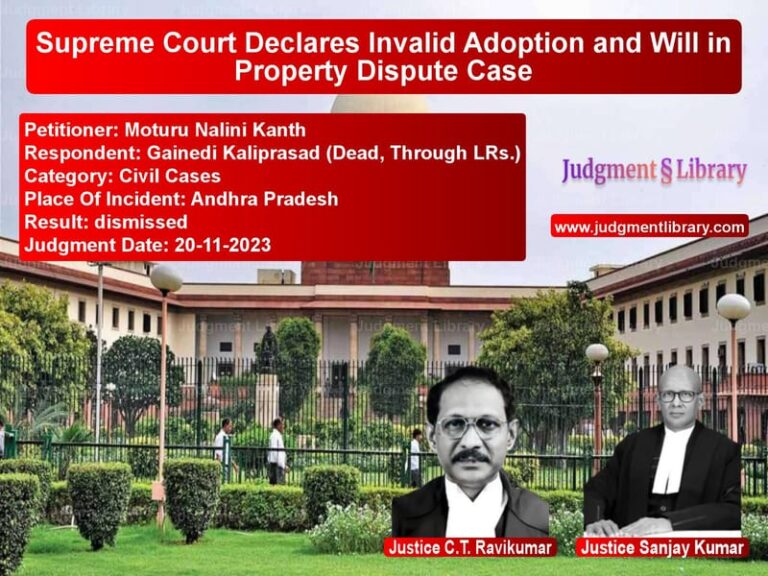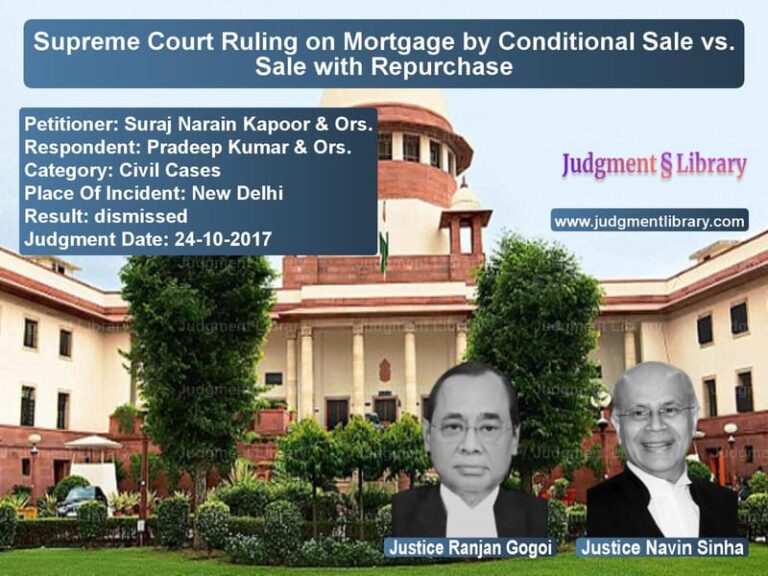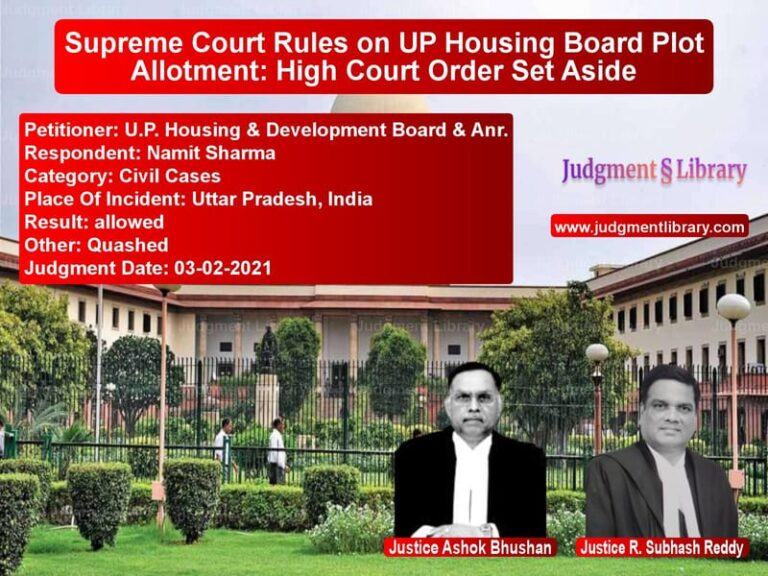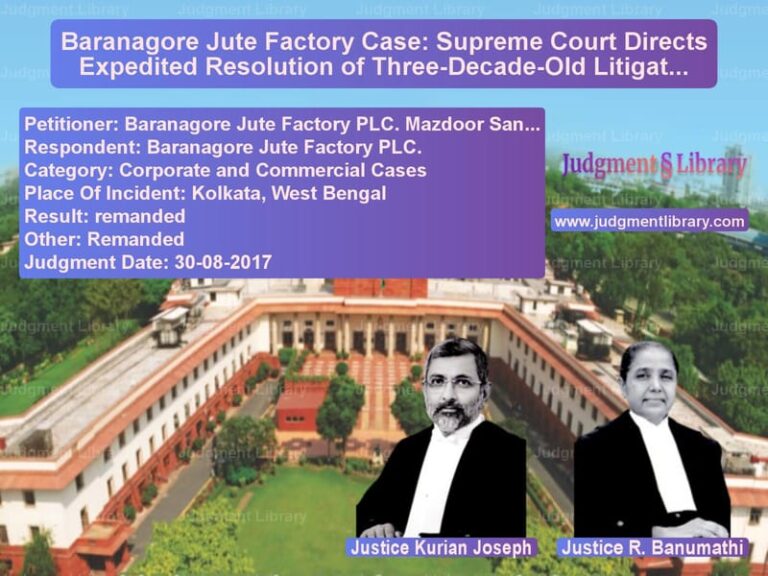Supreme Court Clarifies Scope of Section 319 CrPC: Summoning Additional Accused Post-Trial
The Supreme Court of India recently delivered an important judgment in the case of Jamin & Anr. v. State of Uttar Pradesh & Anr., which deals with the summoning of additional accused under Section 319 of the Code of Criminal Procedure (CrPC). The judgment clarified whether a trial court can invoke its powers under Section 319 after the conclusion of a trial and how revisional courts should handle such matters. The Court’s ruling has significant implications for criminal law and procedural fairness.
Background of the Case
The case arose from an FIR registered in 2009 in Hardoi, Uttar Pradesh, involving allegations of murder under Sections 147, 148, 149, and 302 of the Indian Penal Code (IPC). The primary allegations were:
- The complainant’s brother was allegedly murdered by a group of individuals.
- The FIR named five accused persons, including the appellants.
- The police, after investigation, filed a chargesheet against only two of the five named accused.
- The trial proceeded, and in 2011, the two accused were convicted.
Despite the conviction of two accused, the complainant filed multiple applications under Section 319 CrPC seeking the summoning of the three remaining accused (including the appellants) for trial. These applications were repeatedly rejected by the Trial Court on the ground that the trial had already concluded.
Legal Battle Over Section 319 CrPC
Trial Court’s Decision
The complainant had moved an application under Section 319 CrPC to summon the remaining three accused based on new evidence that emerged during the trial. The Trial Court rejected the application, stating:
“Once the trial has concluded and the accused have been convicted, the power under Section 319 cannot be exercised to summon additional accused. The proceedings have reached finality.”
The Trial Court emphasized that Section 319 must be invoked during the trial and not after its conclusion.
High Court’s Intervention
The complainant challenged the Trial Court’s rejection in the Allahabad High Court. The High Court ruled in favor of the complainant and set aside the Trial Court’s decision. The High Court observed:
“The power under Section 319 is substantive and must be exercised to prevent a miscarriage of justice. The rejection of the application at the trial stage was erroneous. The Trial Court must reconsider the evidence and summon the accused.”
Following this ruling, the Trial Court was directed to summon the remaining accused, including the appellants. The appellants then approached the Supreme Court challenging the High Court’s order.
Arguments Presented Before the Supreme Court
Appellants’ (Accused’s) Arguments
- The Trial Court had become functus officio (lost its authority to act) after delivering its final verdict in 2011.
- The complainant had multiple opportunities to seek summoning of the additional accused during the trial but failed to do so.
- The High Court acted beyond its jurisdiction by directing the summoning of additional accused after the completion of the trial.
- The evidence against the appellants was insufficient and did not meet the threshold required under Section 319.
Respondents’ (State of Uttar Pradesh’s) Arguments
- Under Section 319(4) CrPC, once an accused is summoned, a de novo (fresh) trial must be conducted.
- The complainant had pursued the matter diligently, and the rejection of the application by the Trial Court was legally incorrect.
- The High Court correctly exercised its revisional jurisdiction, as the Trial Court had wrongly dismissed the application.
- The evidence presented during the trial clearly indicated the involvement of the remaining accused, necessitating their trial.
Supreme Court’s Analysis
1. Scope and Limitations of Section 319 CrPC
The Supreme Court reaffirmed the principle that Section 319 CrPC can be invoked only before the conclusion of the trial. It noted:
“The power under Section 319 is extraordinary and must be exercised with caution. The provision is meant to ensure that no person who ought to face trial escapes the rigors of law. However, it cannot be used to reopen concluded trials.”
2. Functioning of the Revisional Court
The Supreme Court criticized the manner in which the High Court exercised its revisional jurisdiction, stating:
“The revisional court should not interfere with well-reasoned orders of the Trial Court unless a gross miscarriage of justice is evident. The High Court acted beyond its jurisdiction in directing the summoning of accused post-trial.”
3. Evidentiary Threshold Under Section 319
The Court emphasized that for an accused to be summoned under Section 319, the evidence must be of a higher standard than prima facie evidence. The Court found that the evidence against the appellants was not strong enough to justify their summoning.
4. Impact of Delayed Summoning
The Court noted that allowing summoning after a long delay could lead to an unfair trial and disrupt the legal process.
“The purpose of criminal law is to ensure fair and expeditious justice. Allowing summoning after a decade-long delay undermines this objective and prejudices the rights of the accused.”
Final Judgment
The Supreme Court ruled in favor of the appellants and set aside the High Court’s order. It concluded:
“The application under Section 319 was filed after an unreasonable delay and after the trial had concluded. The High Court erred in setting aside the Trial Court’s decision. Accordingly, the appeals are allowed, and the order summoning the appellants is quashed.”
Key Takeaways from the Judgment
- Timing is Critical: Section 319 must be invoked during the trial, not after its conclusion.
- Limited Scope of Revisional Jurisdiction: High Courts must not interfere in summoning orders unless there is clear injustice.
- Strict Evidentiary Standard: The evidence against additional accused must be stronger than mere suspicion.
- Prevention of Misuse: The ruling prevents delayed summoning applications from being used as a tool for harassment.
Conclusion
The Supreme Court’s ruling in this case sets an important precedent for the application of Section 319 CrPC. By clarifying that additional accused cannot be summoned after the conclusion of a trial and by reinforcing the need for strong evidence before invoking Section 319, the judgment upholds principles of fairness and due process. This decision ensures that courts do not misuse procedural provisions to reopen trials and that accused persons are not subjected to undue legal harassment years after a trial has concluded.
Petitioner Name: Jamin & Anr..Respondent Name: State of Uttar Pradesh & Anr..Judgment By: Justice J.B. Pardiwala, Justice Manoj Misra.Place Of Incident: Hardoi, Uttar Pradesh.Judgment Date: 06-03-2025.
Don’t miss out on the full details! Download the complete judgment in PDF format below and gain valuable insights instantly!
Download Judgment: jamin-&-anr.-vs-state-of-uttar-prade-supreme-court-of-india-judgment-dated-06-03-2025.pdf
Directly Download Judgment: Directly download this Judgment
See all petitions in Bail and Anticipatory Bail
See all petitions in Attempt to Murder Cases
See all petitions in Fraud and Forgery
See all petitions in Custodial Deaths and Police Misconduct
See all petitions in Extortion and Blackmail
See all petitions in Judgment by J.B. Pardiwala
See all petitions in Judgment by Manoj Misra
See all petitions in allowed
See all petitions in Quashed
See all petitions in supreme court of India judgments March 2025
See all petitions in 2025 judgments
See all posts in Criminal Cases Category
See all allowed petitions in Criminal Cases Category
See all Dismissed petitions in Criminal Cases Category
See all partially allowed petitions in Criminal Cases Category







